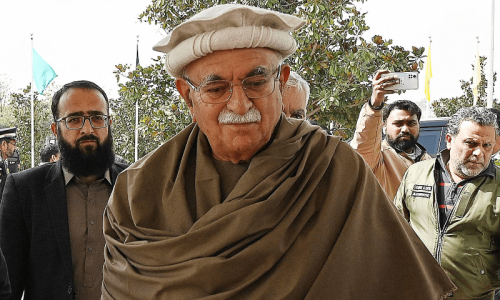IT is certainly a complicated date in the history of the subcontinent. Pakistan and Bangladesh, having achieved independence as a single entity, were broken apart on Dec 16, 1971. Known in present-day Pakistan as the Fall of Dhaka, it is celebrated in Bangladesh as the culmination of the War of Liberation.
Pakistan and Bangladesh need never have been torn apart, but historic, undeniable mistakes by West Pakistani leaders, the eagerness of India to help dismantle the Pakistani project, and — it must not be denied — the struggle of East Pakistan’s leaders contributed to the creation of a new nation-state.
More than four decades on, the wounds caused by those wrenching events ought to have healed, but they are in fact being reopened by the Bangladeshi government.
Bangladesh Prime Minister Sheikh Hasina Wajed, daughter of Mujibur Rehman and leader of the Awami League, appears to have decided that her domestic battles with the Bangladesh National Party and sundry Islamist opposition parties, headlined by the Jamaat-i-Islami, is best fought by dragging Pakistan into the controversy.
Vilifying Pakistan, forcing through dubious trials in the International Crimes Tribunal — a national court, executing Bangladeshi political leaders who supported unity in 1971, and creating new and wholly unnecessary hurdles in the issuance of visas for Pakistanis, Ms Wajed and her supporters have run the gamut from dangerous cynicism to state-sanctioned violence.
This needs to stop. Pakistan, for all the mistakes its leaders made between 1947 and 1971, is supportive of Bangladesh, respectful of its independence and seeks closer, mutually beneficial ties. But the Bangladeshi government only appears willing to see Pakistan through the prism of domestic politics.
With the Khaleda Zia-led BNP and its Islamist allies implacably opposed to an AL government, Ms Wajed and her government have opted to retaliate rather than seek reconciliation.
That, in the AL’s reckoning, involves reiterating the party’s liberation credentials — which in turn means escalating Pakistan-bashing. It is dangerous stuff. Unhappily, the response by Pakistan has been less than edifying.
Be it elements within the political government or the Islamist parties or sections of the military establishment, the reaction to Bangladeshi provocations has been to launch into incendiary rhetoric here. That is, to put it mildly, historically incongruous.
For a country that, among other shameful measures, long suppressed the only official report on the events leading up to December 1971, it is perhaps best to always keep a hand outstretched to Bangladesh — no matter the immediate response from the other side.
Published in Dawn, December 16th, 2015













































